Recently, I have started to greatly irritate my boyfriend (well, more than usual anyway) by predicting scenes before they happen on TV. It began with the new Black Mirror; the episode was Mazey Day, about the terrible lengths paparazzi will go to quite literally hunt their celebrity subjects.
One subject in question, Mazey, played by Clara Rugaard, unravels once she starts to suspect that she has become a werewolf (I never said the episode was any good) and spends one particular evening holed up in her apartment, feeling sad and desperate.
“This will be the scene in which she pours herself a giant glass of Chardonnay then drops it”, I said to my boyfriend.
Once it happened, naturally, because this has always been what sad women do on TV (don’t execs know we also drink red wine when we’re crying?), he raised an eyebrow respectfully.
“Now she’s going to try and pick up all the glass shards and cut her fingers,” I continued, because this is what crying women do when they’re also unhinged and stupid.
The TV obeyed, and my boyfriend eyed me with a mixture of suspicion and awe.
For a while these armchair prophecies continued with a high success rate, thanks to several listless summer weeks of watching enough mediocre-to-heinous shows on Amazon Prime that I felt like I had accidentally embarked on a TV Tropes crash-course.
This became particularly jarring when it came to thrillers. “Now his phone is about to ring,” I whispered during a tense scene of Idris Elba’s Hijack, when Elba’s son is hiding from a pair of killers upstairs, but – curses! – has left his phone downstairs. Of course it did and a cushion was thrown at my head.
Things got a little ropey when it came to BBC show Wolf, which felt like it had been written by someone with eight different brains and personalities, and so nothing was predictable, which meant I was just shouting mad stage directions at the TV and drowning out the dialogue.
This week, however, my record has become pristine once again, after watching the first episode of what might possibly be the worst piece of television I have seen in the last two years: Wilderness, also on Prime, starring Jenna Coleman as a jilted wife taking murderous revenge on her husband while he’s trying to win back her trust on a ‘trip of a lifetime’.
It’s always particularly bad when the main character is a writer, which, considering TV shows are written…by writers… I am puzzled by just how wrong they can get it. For instance, Coleman’s journalist character Liv has just started to write her much-anticipated novel, and there is a preposterous scene in which she opens a bank document and begins to write, instantly, without so much as a note, her expression serene and blissful as she continues, day after day, curled up on a sofa. It was the same with Jane Sloan in The Bold Type. Of course the reality for journalists, or any writer, attempting to begin a novel is decidedly different: our faces twisted in fear and self-loathing, violent pacing and crying, enormous chunks of prose deleted over and over again.
(I should also note that I then spent 10 minutes trying to rewind to the milli-second in which we see the opening paragraph of Liv’s novel on screen, in case it provided some inspiration. Here it is: “It turned out there was no good way to start. Just one dead end after the other. On making this realisation, Alys felt better. And just did. She wouldn’t have to show anyone, or even tell anyone she was writing, no, this could be something for one person.” Blimey. I think even the most doomed aspiring author can find some solace there, though at least they’ve swerved one baseless trope – writers writing their debut novels about writers is entirely accurate.)
When Liv finds out her husband is cheating on her after reading an X-Rated text message and, absurdly, finding a sex tape from his other woman on his work email, I predict several things: she will start drinking wine, throw her phone across the room or into a body of water, will swipe the Christmas dinner she painstakingly just made across the table and destroy some of her ex’s belongings.
Indeed she pours herself a large glass of wine, throws her alarm across the room, begins smoking in bed, trashes her dinner table, and creates a mini bonfire with her ex’s clothes, while swigging whiskey from the bottle. I also thought that, exhausted from her outburst, she might slide slowly down the wall onto the floor, crying, but that trope was left alone.
The other day, I was watching an interview with Ashley Walters about the final season of Top Boy, in which he reveals three things he believes should never be seen on TV: riots, football matches and nightclubs, because the excitement and energy present in those three situations can never be recreated on screen without feeling fake or cheesy.
I completely agree, the worst being the club scenes, because they happen so often, usually when the main female character – often middle-aged and a mother – is experiencing a moment of chaos or liberation. She must of course then order a shot and throw her head back sexually and with brazen, newfound independence. Perhaps she will then be given a pill by a stranger (because she says yes to everything now!) and will move around the dance-floor in ecstatic slow motion, arms up above her head, eyes closed, looking unhinged but liberated.
Last night I spent a while looking through the ‘worst TV tropes’ subReddit, and here are a few particularly good ones:
“That people are always naked, having sex, or murdering people in front of huge, uncovered windows that others can see into.”
“When the bad guy has spent the entire movie trying to kill the hero and they finally get them alone and they stop to monologue about why they want to do it, giving the hero time to escape.”
“Stopping in at a friend’s house for breakfast on your way to work.”
“Intrinsically knowing when a phone conversation is over and hanging up the phone without saying goodbye or at least making sure you have all the information.”
“The sleepy hand reaching over to the other side of the bed, patting an empty space and waking up confused when there’s nobody there.”
“There is always a car space right in front of the house/business the character is driving to.”
But you know the one that really drives me up the wall? When a character is drinking from an empty tea cup.
This week in links
I’ve been reading this incredibly combative interview with former Rolling Stone editor (and co-founder) Jann Wenner, who has rightly been pilloried for choosing only white men for his new book ‘The Masters’; interviews with what he calls “philosophers of rock”. When the interviewer confronts him, Wenner reasons that no black artists or women artists have been “articulate” enough for him to include – a truly insane remark, particularly in 2023.
Wenner also admits to having given many of his interviewees at the magazine copy approval, insisting that there “are two types of interviews”: confrontational and cooperative. I agree with him if we’re talking medium – my interviews on my pop culture podcast for instance, are not confrontational, because we are not a news/political or investigative outlet, and, via an audio format, combative, awkward interviews are unpleasant to listen to, unless it’s part of the brand USP. That said, despite being ‘just entertainment’, we have never allowed a guest content approval.
Besides, Rolling Stone, under Wenner’s editorship, prided itself on its political and investigative reporting, using a rigour I had hoped would extend to its music journalism. And, considering how many music titles I know who do now give copy approval to artists, which has made the majority of music interviews read like press releases, it’s sad to think it may have been normalised so long ago by such a prestigious title as Rolling Stone. Ultimately, I think the best interviews don’t set out to be either confrontational or cooperative, and the most skilled interviewers know that.
Also, this very good piece about how XL Bully breeding has essentially become a Ponzi scheme.
And this profile of critic and ‘literary it girl’ Merve Emre is absolutely hilarious, with Emre so absorbed by the world of books and criticism she once went without a phone for five whole months, and cannot find time to go to the optician’s, and so has borrowed her husband’s contact lenses for the last 10 years. Some lines could be parody: “She reads as many as two books a day. For every book she writes, she gets a tattoo of its call number in the Library of Congress on her side”. And, considering Emre spends her life reading and writing about books about other people, this line questioning why she’s even being interviewed in the first place might prompt a few eye-rolls: "Why is anyone interested in anyone as a person? I'm someone who just often cannot fathom why people want to read about other people."
I’ve been talking all things Russell Brand with my co-host Kathleen on our podcast Straight Up, and specifically, why some of his supporters are so obsessed with this ‘establishment media conspiracy.’ Listen here.
I’ve been watching KATE at Soho Theatre. Talking of tropes, in this whip-smart one-woman show, American comic Kate Berlant sends up a litany of ‘actorly’ tropes, from performers connecting their near-pathological addiction to the camera with a deep insecurity from their childhood (“I could be anyone in front of the camera… anyone except…myself”) to an obsession with identity and otherness (“I was half Spanish, half Jewish… they don’t even have a word for that”). It is a brilliant dismantling of ego and narcissism. Book tickets here.
I can’t stop thinking about the most stylish hotel I’ve ever been to: MONA Athens, where I stayed a couple of weeks ago, in Athens’s most lively neighbourhood, Psirri. It has the most amazing rooftop, full of sofas and gorgeously mis-matched furniture, looking across the centre of the city and up to the Acropolis, which, lit up at night while you’re drinking wine from the honesty bar, feels magical. The hotel design is beautiful, converted from a 1950s, eight-floor industrial warehouse, keeping its original terrazzo floors and cast iron staircase.
The rooms are pure romance: enormous, free-standing baths, low beds and sofas in pale green and stone, floor-sweeping velvet curtains and exposed stone walls. Some even have balconies. Even the breakfast (included in the room rate) was amazing: sourdough served with about eight different mezze dips, including a date and peanut butter spread, followed by eggs and then French toast. Plus you can have it served up on the roof if you order the night before. Sadly I left before I could go to one, but they also have a Supper Club series which looks incredible. Rooms start at £148 per night.
Round the corner from Mona is Birdman, a buzzy, Japanese grill that will genuinely send meat-lovers up to heaven and back. Every single person who had been to Athens recommended it to me before I went – as did everyone I met in Athens once I got there – and it’s no exaggeration to say it might be in my top five restaurant experiences ever. You must try the Iberico Katsu sandwich, with red cabbage and apple tonkatsu sauce, plus the Wagyu beef gyoza and Japanese chimichuri lambchops. Also the cocktails are excellent, try the Momo Spritz (Aperol, peaches and ginger), the Pink Martini (sake, pomegranate, hibiscus, Islay whisky) as well as the Oshakawa (yuzu gin, sakura, sour kafir leaves). Music lovers won’t want to leave, they play vinyl funk and hip-hop records all night. (If anyone needs more Athens reccos, let me know).
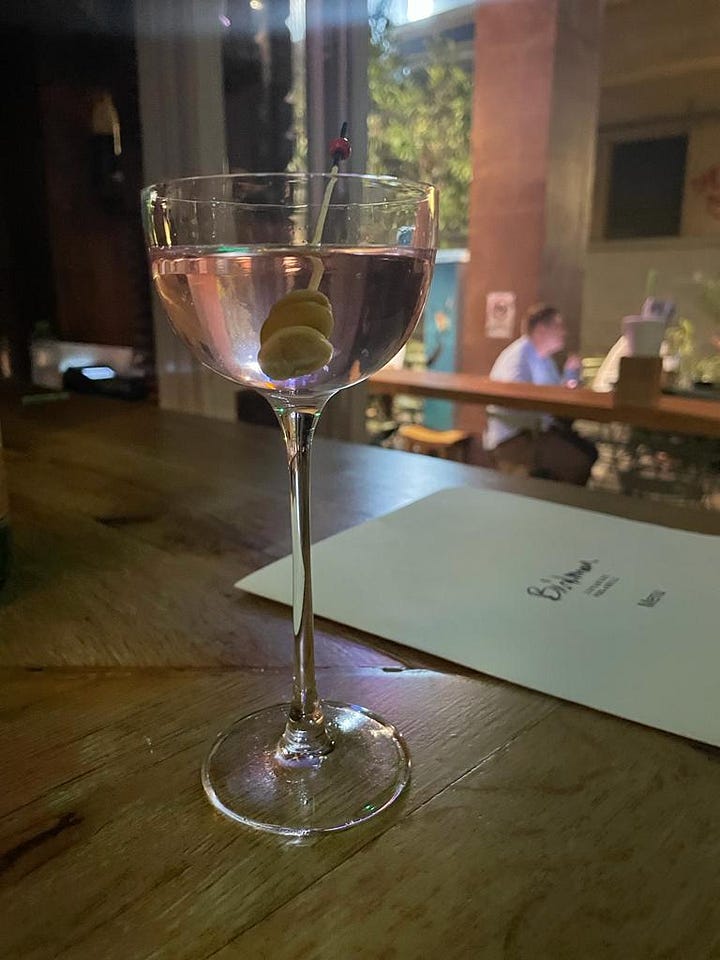
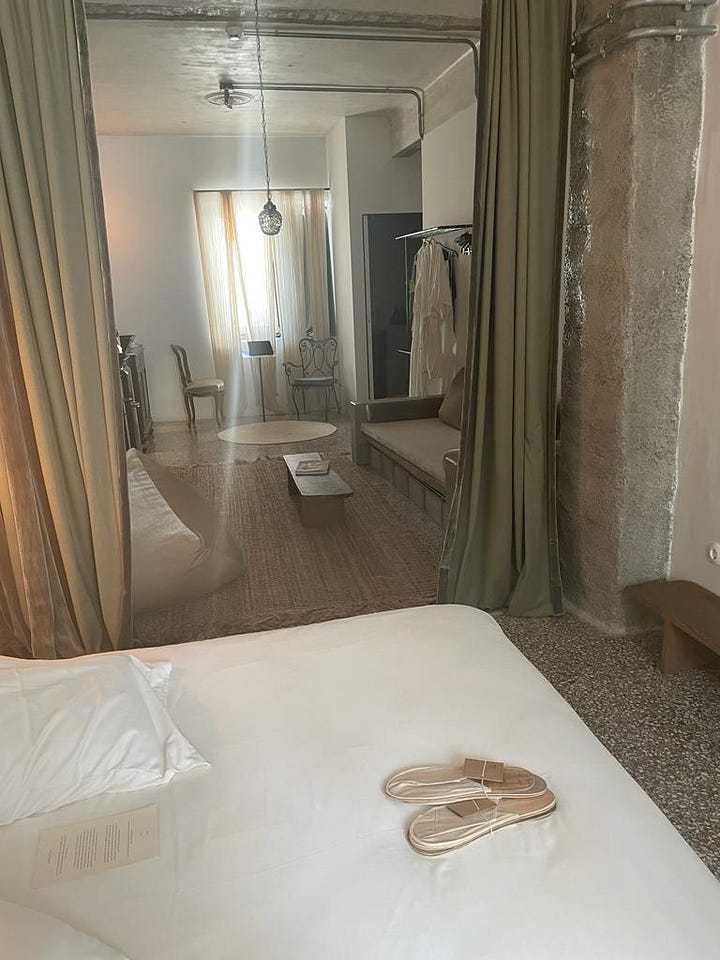
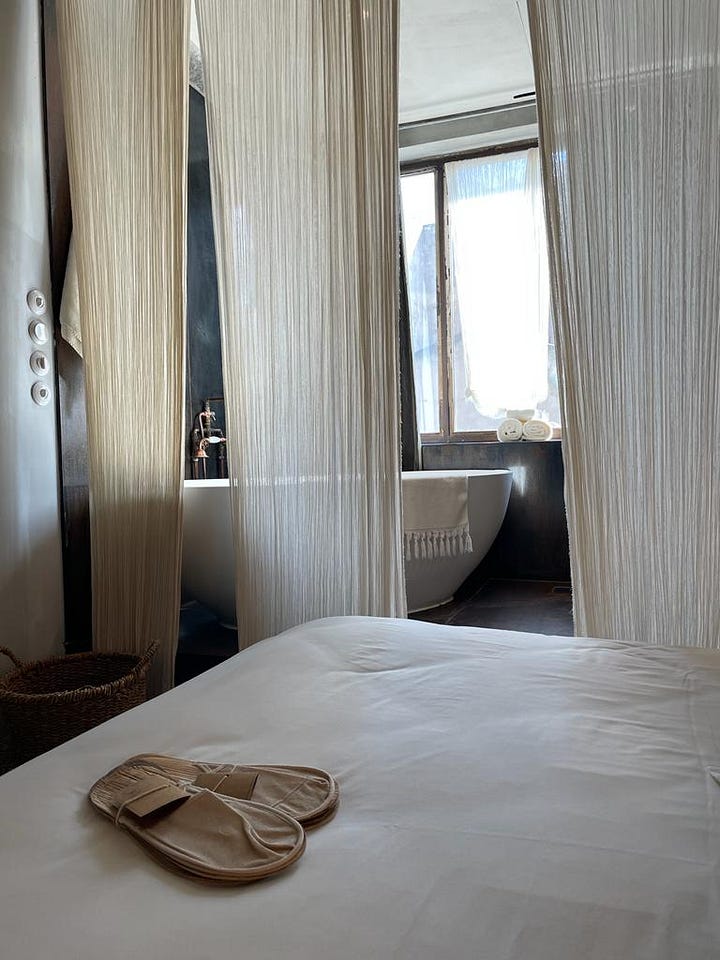
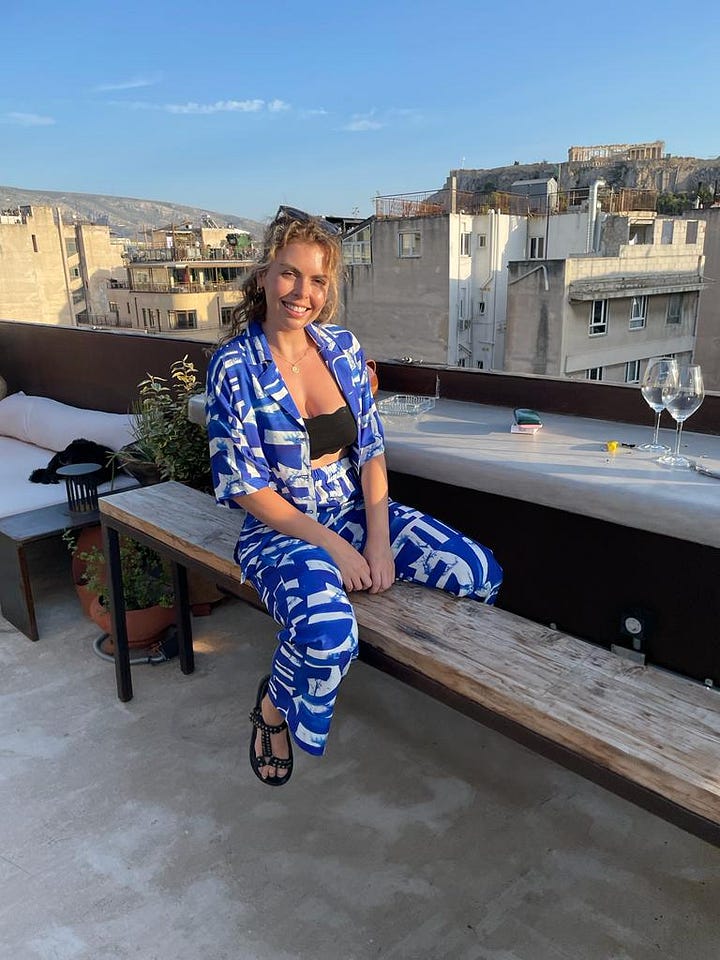
Thanks for reading! If you enjoyed it, leave a comment (with your worst TV tropes!) or reply to this email. You can also buy me a coffee via Ko-Fi.

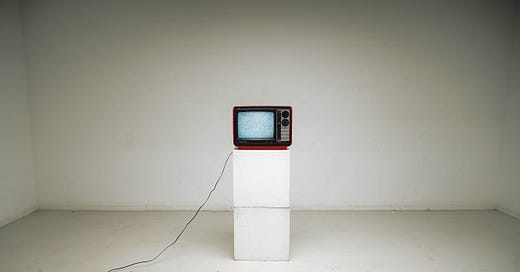



This reminded me that the incredible Self Esteem (aka Rebecca Lucy Taylor) is always fuming that white wine is seemingly luke warm on every soap